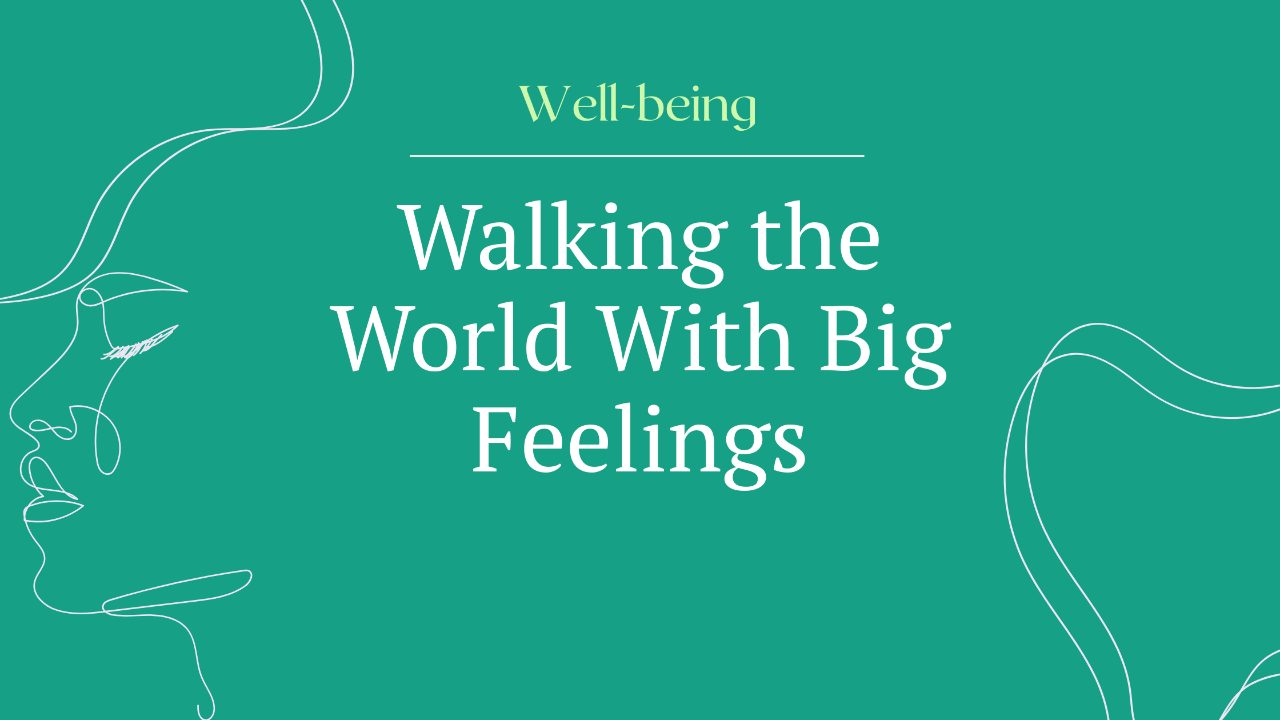✨ How to Walk Through the World When You Feel Everything
Nov 11, 2025
A guide for empaths, sensitives, and anyone who’s ever been told “you’re too much”
I always heard the word “empath” growing up, but I never really connected with it.
I didn’t know what it meant. No one ever explained it to me.
I just knew that ever since I was little, I walked through the world with so much sensitivity.
I picked up on everything.
I felt the room, the tension, the tone in someone’s voice.
I didn’t just hear people—I felt them. I leaned in. I absorbed their energy, their emotion, and their experience.
It came naturally to me.
But I didn’t understand the impact of this.
Not in my personal life.
Not in my relationships.
And definitely not at work.
I thought I was supposed to give everything
I wanted to be in busy, brilliant places—Silicon Valley, New York, LA.
Where people were creative and ambitious and lit up about what they were building.
And I gave my all.
My whole being. Mentally. Emotionally. Physically. Sometimes even spiritually.
When I worked as a product manager at Meta or Shopify, or when I ran my own company—
I poured everything into it.
And for a long time, I thought that was what it meant to be committed.
I didn’t even consider the consequences.
It was like I was walking through the world completely unprotected.
No energetic boundaries. No emotional filters.
Just fully open—thinking this is how it’s supposed to be.
Eventually, I realized: this isn’t sustainable
After a decade of living that way, I started asking different questions.
What if the answer isn’t to change who I am?
What if the answer is to learn how to support who I am?
I started to unpack things I’d heard from therapists, coaches, and psychologists.
Words like “boundaries,” “resilience,” and “self-protection.”
But honestly, a lot of that language didn’t sit right with me.
I didn’t want to be rigid.
I didn’t want to shut people out.
I didn’t want to stop bringing my full self to work, to relationships, to creative collaborations.
So I went looking for another way. A better way.
Step 1: Honor your sensitivity
The first thing I had to do was stop shaming this part of myself.
My sensitivity wasn’t a flaw.
It wasn’t something I had to fix or hide.
It was information.
It helped me relate.
It helped me feel things other people missed.
It helped me see patterns before they played out.
I wasn’t “too sensitive.”
I just hadn’t learned how to care for that sensitivity.
Step 2: Release control
Being sensitive makes you want to fix everything.
Especially when someone you love is hurting.
Or when the world feels like it’s on fire.
Or when something’s just not right in a team, a project, or a community.
But I had to learn:
Just because I feel something doesn’t mean I’m responsible for it.
👉🏽 Sometimes your partner is struggling, and it’s not yours to fix.
👉🏽 Sometimes the news is heartbreaking, and it’s not yours to carry alone.
👉🏽 Sometimes your co-worker is upset, and it’s not because of you.
You can care. You can feel it.
But you don’t have to become it.
Step 3: Let go of attachments
This one was hard.
I used to get so attached to how I thought things should go.
Attached to titles. To promotions. To people. To cities. To outcomes.
To making sure everything worked out just right.
But the truth is, life rarely works out “just right.”
And when you’re sensitive, attachment becomes heavy fast.
So I started practicing detachment—not in a cold way, but in a loving way.
Not letting go of caring—
Just letting go of the need to control.
Step 4: Don’t shut down—participate fully
When you start detaching, it’s easy to swing too far.
To think: “Okay, I won’t get involved. I’ll just protect myself. I’ll keep my distance.”
But that’s not the answer either.
The real practice is showing up fully and knowing when to pull back.
Being in the world and knowing how to cleanse what you pick up.
It’s learning how to move the energy through you—
So you don’t carry it into tomorrow.
Step 5: Build a system that works for you
This is what changed everything.
I started taking spiritual cleansing and energetic hygiene seriously.
Like a non-negotiable.
For some people, it’s the gym.
For others, it’s baths, breathwork, prayer, and walking barefoot in nature.
For me? It’s all of that—and more.
It’s about creating moments every day to come back to myself.
To separate me from everything I’ve picked up.
To ask:
👉🏽 Whose thoughts are these?
👉🏽 Whose emotions are these?
👉🏽 What’s mine, and what do I need to return?
Final Thoughts: You don’t have to change—just learn to work with yourself
I started understanding something that a lot of therapists and psychologists don’t really talk about:
Energy.
Sensitivity.
Perception beyond logic.
Our sensitivity isn’t a weakness. It’s a gift.
It means we get to love more deeply.
Create more honestly.
Notice more beauty.
Feel more of life.
It’s not about shielding yourself or shutting down.
It’s about learning how to move things through you.
So you don’t get stuck.
So you don’t burn out.
So you can keep showing up—with your whole heart.
If you’ve ever been told “you’re too sensitive”…
Pause.
Take a breath.
And say: “Thank you.”
Because you were created to feel.
And the more you learn how to work with that part of you, the more powerful it becomes.
Not chaotic.
Not overwhelming.
But clear.
When your sensitivity becomes a skill, it becomes your superpower. 🔥
Welcome to Ambition Redesigned! Where purpose meets progress.
Get one actionable tip delivered to your inbox every Monday.


